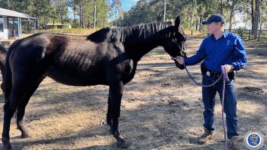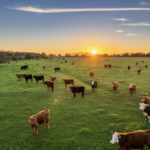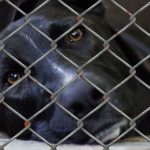The Criminal Offence of Stealing Cattle in New South Wales

New South Wales police officers from the Orana Mid-Western Police District and the Rural Crime Prevention Team (RCPT) charged individuals in respect of the offence of steal cattle on Thursday 25 September 2025, after they’d allegedly stolen a horse that was in a paddock on Wiradjuri land in the NSW town of Dubbo on Thursday 24 April 2025, but had gone missing by 4.30 pm the following afternoon.
The RCPT was first alerted to the incident by a 46-year-old woman who’d placed the mare in a paddock on Dubbo’s Hillside Drive, prior to finding it missing. The four individuals that have been charged over the theft were initially spoken to by NSW police at the time it executed a search warrant in Dubbo, as well as two more on Worimi land in the NSW coastal town of Tea Gardens.
Stealing cattle is an offence that sits under section 126 of the Crimes Act 1900 (NSW), and it carries up to 14 years imprisonment. Despite ‘cattle’ only really referring to cows in common parlance, in respect to the crime of stealing cattle, it can be used to cover horses, mules, bulls, sheep, pigs, goats and camels. Indeed, the crime of stealing cattle takes in a range of stock and draft animals.
The theft of livestock has become a rising issue in the rural regions across this continent. And while the current case didn’t involve any interstate manoeuvres, University of New England criminologist lecturers Kyle JD Mulrooney and Alistar Harkness, writing in the Conversation in 2023, explained that often stock thieves move their contraband across state borders and over long distances.
According to their article, around 70 percent of Victorian farmers and 80 percent of those in NSW have been the victim of stealing cattle over their lifetimes, and many of them have been serial victims of the crime. The academic further adds that while farmers often experience crimes such as trespass and illegal shooting on properties, the theft of stock is particularly problematic.
Offence particulars
The offence of steal cattle has sat under section 126 of the Crimes Act since it was originally enacted in 1900. In terms of how a prosecution might lead a court to convict suspects in relation to stealing livestock, it must prove that those charged either stole the live animal or that they wilfully killed the animal to steal its carcass, skin or any other part of its body.
The stealing of property involves an individual taking it with the intention of permanently depriving the owner of the item. In terms of the defences that can be raised against steal cattle, these include the defence of duress, or that someone else forced the accused to commit the crime, along with the claim of right, which involves the take of the property considering it was rightfully theirs.
Mulrooney and Harkness outline that the reasons high rates of theft exist in farming areas is due to geographic and cultural factors. Low population density, a lack of law enforcement presence and vast open spaces in rural areas make the commission of crimes more attractive, and they note that the crime prevention features of urban areas, like CCTV cameras, don’t feature in the countryside.
Preventing rising stock theft
The Rural Crime Prevention Team that laid the charges against the four alleged horse thieves last week is a NSW police unit that specialises in farm theft. Two issues that the specialty law enforcement unit comes up against is that farmers only check their stock intermittently, so there is often a delay in crime detection and there is difficulty is tracking and identifying livestock.
The RCPT coordinator detective chief inspector Cameron Whiteside told the press in July that a key way to prevent stock thieves in NSW is to report the crimes to police, as one of the reasons that farm theft continues is that many owners are reluctant to report such incidents to police. A 2021 NSW farm crime survey further found that farmers were pleased with their experiences with the RCPT.
“Many of my team members are producers themselves, or they’ve worked in the industry in jobs such as shearing or wool-classing, so they’ve got industry knowledge,” Whiteside told Meat and Livestock Australia two months back.
“We’re not there to tell producers how to run their business, but we can support them and help them reduce their vulnerability to theft in simple, actionable ways.”
The University of New England lecturers further note in their article that new technologies are being applied to prevent the theft of live animals from farms and these include smart animal ear tags, along with the introduction of facial recognition technologies that can identify the muzzle of an animal, which is said to be as distinct as a human fingerprint.
NSW police warned in May 2024 that a crimewave in rural NSW had cost farmers more than $930,000 so far that year. This came after eight calves went missing from a farm in the NSW town of Cowra, while at the national level, 306 head of cattle were pinched from a property in the Western Australian Kimberley region, and another WA individual was charged with stealing 150 cows.
Horses returned to rightful owners
Prior to charging the suspected horse thieves, NSW police had executed three search warrants in respect of the stolen Dubbo mare, which involved the search of a home on Bunglegumbie Road in Dubbo, as well as two other premises in the town of Tea Gardens: one house on Yalinbah Road and another on Viney Creek Road.
Two stolen horses were located at the Tea Gardens property on Viney Creek Road, one of which was the Dubbo mare, and both of those equines have been returned to their rightful owners.
Two men and two women have been charged over the theft. The two women aged 23 and 42 have been charged with steal cattle, and a 44-year-old man has been charged with steal cattle, enter non-agricultural land to commit an offence and drug possession, while a 19-year-old male has been charged over stealing the horse and trespassing on a property to do so.
NSW police officers issued all four suspects with court attendance notices (CANs), calling on them to appear before Dubbo Local Court on 12 November 2025.







